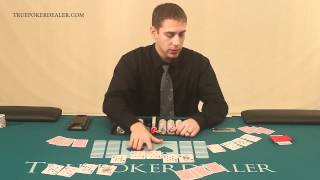Learn Texas Holdem Video Source & Info:
Join the Truepokerdealer Facebook Group at https://www.truepokerdealer.com/join
This video is part 2 of our introduction to the poker rules and procedures that professional poker dealers have to learn. It takes the poker hand rankings that are explained in part 1 and builds on them by going over an example hand for the three basic types of casino poker: texas hold ’em, omaha hold ’em, and 7 card stud. The topics covered here are the same as what you would learn in a poker dealer school.
Texas Hold ’em, often referred to as “hold ’em” for short, is dealt out by giving 2-10 players two cards apiece, dealt face-down, and then dealing five community cards that all players share. To determine a player’s five card, poker hand, combine a player’s two card starting hand with the five community cards. Out of those seven cards, the best five are the poker hand that counts.
In Texas Hold ’em, before bringing any community cards, the dealer burns a card (essentially puts a card aside from the top of the deck) to ensure that no one has been able to mark a card and identify the next card to come. Then three community cards are dealt together (the “Flop”). Then another card is burned and a single community card is dealt (the “Turn”). Then another card is burned and another single community card is dealt (the “River”).
Omaha Hold ’em, usually referred to as just “Omaha,” is dealt out by giving 2-10 players four cards apiece, dealt face-down, and then dealing five community cards that all players share. To determine a player’s five card poker hand, combine a player’s four card starting hand with the five community cards, using exactly two from the player’s starting hand and exactly three from the community cards.
Just like in Texas Hold ’em, the dealer burns cards and brings a flop, turn and river.
Omaha Hold ’em is often played as a hi / lo game. “Hi / Lo” is referring to a variation on any type of poker in which there is potential for a split pot at the end of the hand. In hi / lo, half the pot goes to the high hand and half the pot goes to the low hand. This is very common for limit Omaha games.
Seven Card Stud, sometimes referred to as just “Stud,” is dealt out by giving 2-8 players two cards apiece face-down and then dealing each player one more card face-up, followed by a burn card, a face-up card to each player, a burn card, a face-up card to each player, a burn card, a face-up card to each player, a burn card, and then a face-down card to each player. There are no community cards in any version of Stud.
To determine a player’s five card poker hand, use the best 5 card combination possible out of the 7 cards that player was dealt.
Betting rounds are a part of every type of casino poker.
There are two fundamental concepts in poker that most of the rules in poker are created from:
Cards Speak – The only thing that entitles a player to win a pot is their cards. That does not mean they have to be the best cards since everyone else may have folded.
One Player Per Hand – No one may help a poker player make any decision about their hand. They must play 100% on their own.
I deal each of these poker hands as examples.
Source: YouTube








why did draw poker fade out of style? you hardly ever see that in a poker room anymore
HOw many bank cards do you allow each player?
What if your best poker hand is the 5 community cards on the table ?
Do i shuffle the deck every after game?
excellent…thanks. this video has really helped me understand Texas Hold 'em….unlike other tutorials
Question: i have a pocket Queen of Hearts and an Ace of hearts. Another player has Queen of Clubs and an Ace Spade. On the table there's three of kind 7s and a Queen Spade. That would be a split correct? Because you can only play 5 cards on the table, the other player kept saying he won because of his Ace Spade but that would be a 6th card in play which is invalid.
When do I know when to burn a card?
If I get 2 and 7 off-suit, I am in trouble.
If I get suited king and ace, the opponents are in trouble.
If I get two suited aces, the dealer is in trouble.
why this man sound so salty damn
This is the only video I could find that actually showed you the procedure of dealing cards. 1 in turn to each player, burn 1, flop, burn 1, turn, burn 1, river